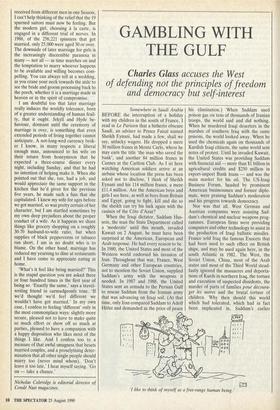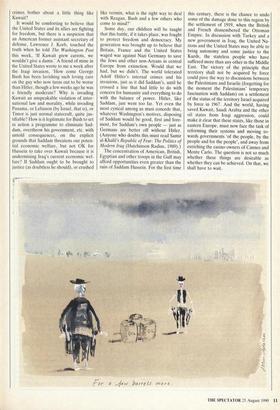GAMBLING WITH THE GULF
Charles Glass accuses the West
of defending not the principles of freedom and democracy but self-interest
Somewhere in Saudi Arabia BEFORE the interruption of a holiday with my children in the south of France, I read in Le Parisien that a hitherto obscure Saudi, an adviser to Prince Faisal named Sheikh Eynani, had made a few, shall we say, unlucky wagers. He dropped a mere 30 million francs in Monte Carlo, where he may earn the title 'the man who saved the bank', and another 84 million francs in Cannes at the Carlton Club. As I sit here watching American soldiers arrive at an airbase whose location the press has been asked not to disclose, I think of Sheikh Eynani and his 114 million francs, a mere £11.4 million. Are the American boys and girls I see here, as well as boys from Britain and Egypt, going to fight, kill and die so the sheikh can try his luck again with the casinos of the Cote d'Azur?
When the Iraqi dictator, Saddam Hus- sein, the man the State Department called a 'moderate' until this month, invaded Kuwait on 2 August, he must have been surprised at the American, European and Arab response. He had every reason to be. In 1980, the United States and most of the Western world endorsed his invasion of Iran. Throughout that war, France, West Germany and other European countries, not to mention the Soviet Union, supplied Saddam's army with the weapons it needed. In 1987 and 1988, the United States sent an armada to the Persian Gulf to rescue Saddam from the Iranian army that was advancing on Iraqi soil. (At that time, only Iran compared Saddam to Adolf Hitler and demanded as the price of peace his elimination.) When Saddam used poison gas on tens of thousands of Iranian troops, the world said and did nothing. When he murdered Iraqi deserters in the marshes of southern Iraq with the same poisons, the world looked away. When he used the chemicals again on thousands of Kurdish Iraqi citizens, the same world sent notes of protest. Until he invaded Kuwait, the United States was providing Saddam with financial aid — more than $1 billion in agricultural credits and $250 million in export-import Bank loans — and was the main market for his oil. The US-Iraqi Business Forum, headed by prominent American businessmen and former diplo- mats, were praising Saddam's moderation and his progress towards democracy.
Nor was that all. West German and Austrian companies were assisting Sad- dam's chemical and nuclear weapons prog- rammes. European firms were providing computers and other technology to assist in the production of Iraqi ballistic missiles. France sold Iraq the famous Exocets that had been used to such effect on British ships, and may be used again here, in the south Atlantic in 1982. The West, the Soviet Union, China, most of the Arab states and most of the Third World stead- fastly ignored the massacres and deporta- tions of Kurds in northern Iraq, the torture and execution of suspected dissidents, the murder of parts of families pour decoura- ger les autres and the brutal torture of children. Why then should this world which had tolerated, which had in fact been implicated in, Saddam's earlier
'I like to think of myself as a free-range human being.' crimes bother about a little thing like Kuwait?
It would be comforting to believe that the United States and its allies are fighting for freedom, but there is a suspicion that an American former assistant secretary of defense, Lawrence J. Korb, touched the truth when he told The Washington Post this week, `If Kuwait grew carrots, we wouldn't give a damn.' A friend of mine in the United States wrote to me a week after the Iraqi invasion, `How come George Bush has been lavishing such loving care on the guy who now turns out to be worse than Hitler, though a few weeks ago he was a friendly moderate? Why is invading Kuwait an unspeakable violation of inter- national law and morality, while invading Panama, or Lebanon (by Israel, that is), or Timor is just normal statecraft, quite jus- tifiable? How is it legitimate for Bush to set in action a programme to eliminate Sad- dam, overthrow his government, etc. with untold consequences, on the explicit grounds that Saddam threatens our poten- tial economic welfare, but not OK for Hussein to take over Kuwait because it is undermining Iraq's current economic wel- fare? If Saddam ought to be brought to justice (as doubtless he should), or crushed
like vermin, what is the right way to deal with Reagan, Bush and a few others who come to mind?'
Some day, our children will be taught that this battle, if it takes place, was fought to protect freedom and democracy. My generation was brought up to believe that Britain, France and the United States waged war against Nazi Germany to save the Jews and other non-Aryans in central Europe from extinction. Would that we had, but we didn't. The world tolerated Adolf Hitler's internal crimes and his invasions, just as it did Saddam's, until he crossed a line that had little to do with concern for humanity and everything to do with the balance of power. Hitler, like Saddam, just went too far. Yet even the most cynical among us must concede that, whatever Washington's motives, disposing of Saddam would be good, first and fore- most, for Saddam's own people — just as Germans are better off without Hitler. (Anyone who doubts this must read Samir al-Khalil's Republic of Fear: The Politics of Modern Iraq (Hutchinson Radius, 1989).)
The concentration of American, British, Egyptian and other troops in the Gulf may afford opportunities even greater than the ruin of Saddam Hussein. For the first time this century, there is the chance to undo some of the damage done to this region by the settlement of 1919, when the British and French dismembered the Ottoman Empire. In discussion with Turkey and a new government in Iraq, the United Na- tions and the United States may be able to bring autonomy and some justice to the Kurds, the stateless people who have suffered more than any other in the Middle East. The victory of the principle that territory shall not be acquired by force could pave the way to discussions between the Palestinians and Israelis (forgetting for the moment the Palestinians' temporary fascination with Saddam) on a settlement of the status of the territory Israel acquired by force in 1967. And the world, having saved Kuwait, Saudi Arabia and the other oil states from Iraqi aggression, could make it clear that these states, like those in eastern Europe, must now face the task of reforming their systems and moving to- wards governments 'of the people, by the people and for the people', and away from enriching the casino owners of Cannes and Monte Carlo. The question is not so much whether these things are desirable as whether they can be achieved. On that, we shall have to wait.











































 Previous page
Previous page